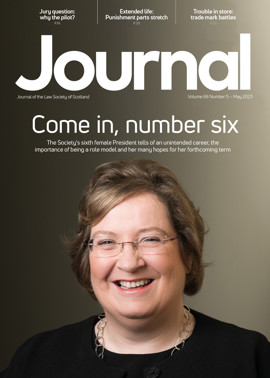Human rights: Crime, detention and mental health issues
In Procurator Fiscal, Perth v ZA [2023] SC PER 11 (14 February 2023), the court required to consider the lawfulness of detaining an accused for an extended period, pending mental health assessment, against their right to security and liberty as protected by article 5 of the ECHR.
Background
ZA, charged with racially aggravated assault and racially aggravated harassment, first appeared in court on 30 August 2021. The case called on several occasions with ZA placed on bail. At an intermediate diet in December 2022, the court adjourned ex proprio motu for a report with a view to making an assessment order, concerns having arisen over ZA’s mental health. On 28 December ZA was remanded in custody.
The court may impose an assessment order in respect of a person charged with an offence where those proceedings remain live. On receiving evidence from a medical practitioner and being reasonably satisfied that the person has a mental disorder, it is necessary to detain the person for assessment, and there would otherwise be a significant risk to the health, safety and welfare of that or any other person, the court may make an assessment order.
A medical practitioner should satisfy the court that the proposed hospital is suitable for assessment, having regard to conditions in the Criminal Procedure (Scotland) Act 1995, s 52D(7). There also requires to be a suitable facility available, including an available bed to accommodate the accused.
Throughout January and February 2023, soul and conscience letters were submitted, attesting that ZA was unfit to attend court by reason of mental disorder. On 13 January a forensic psychiatrist concluded that a psychiatric assessment would be in ZA’s best interests.
On 3 February the case called for a notional trial diet. At this stage, ZA had been in custody for the 40-day statutory maximum in summary proceedings. No hospital bed was available to facilitate the assessment.
ZA being unfit to participate meant starting the trial was not an option. The court had to consider whether to extend the 40 day limit for detention. Refusal would have resulted in the unattractive consequence of ZA being liberated without assurance of welfare support. Granting an extension would encroach on ZA’s article 5 right.
The sheriff extended the period of detention by seven days, this being deemed “the least bad option” (para 5), and required the Crown to intimate the proceedings on the law officers and Scottish ministers, since a compatibility issue might arise. On 10 February, still no bed was available. A further extension was granted to 14 February; by that date it was known that a bed would become available within seven days. The time bar was extended to facilitate the assessment.
Legal framework
The court faced the predicament of balancing ZA’s article 5 right with the state’s obligation to protect both her and the wider community, absent a suitable bed to facilitate assessment. Article 5 is a qualified right with exceptions including the lawful arrest or detention of a person for the purpose of bringing them before the competent legal authority, and the lawful detention of persons of unsound mind (article 5(1)(c) and (e) respectively).
Section 6(1) of the Human Rights Act 1998 provides that it is unlawful for a court (a public authority) to act in a way incompatible with a Convention right. Accordingly, continued detention of an accused requires specific authorisation, otherwise the action could be deemed arbitrary. Section 6(2) qualifies subs (1) in that if a public authority has, by virtue of primary legislation, no alternative but to act in an incompatible way, it is lawful so to act.
The court considered authorities from the Strasbourg court, including Saadi v United Kingdom (2008) 47 EHRR 17. Here, the court observed that “detention of an individual is such a serious measure that it is justified only as a last resort where other, less severe measures have been considered and found to be insufficient to safeguard the individual or public interest which might require that the person be detained” (para 70). The court also recognised the point made by Lord Reed in Brown v Parole Board for Scotland 2018 SC (UKSC) 49 at para 3: “detention of a person as a mental health patient will, however, only be ‘lawful’ for the purposes of article 5(1)(e) if effected in a hospital, clinic or other appropriate institution”, echoing Hutchison Reid v United Kingdom [2003] ECHR 94 at para 48.
Application to the case
The court was not satisfied that an assessment order could be made absent confirmation of an available place: the terms of s 52D appeared to “hard-wire” the need for an available bed (para 20). It identified that the Strasbourg court affords a margin of appreciation to national authorities and that the accused’s article 5 rights do not exist in isolation. In the circumstances, the court was satisfied that the detention was not arbitrary, contrasting Brand v Netherlands (2004) 17 BHRC 398 and Mocarska v Poland [2008] MHLR 228, which held respectively that delays of six and eight months were not reasonable (and thus incompatible with the Convention). Accordingly, it was lawful to extend ZA’s detention period.
Commentary
This case illustrates the systemic issues that are affecting health boards in treating those suffering from mental health issues. The judgment contains observations on how similar cases might be addressed in future. This includes, inter alia, regular and informed oversight by the court in instances whereby a person may continue to be detained in custody while an assessment order is made in a Convention compliant manner.
It will be interesting to observe (1) whether similar cases come before the court in future; (2) whether the observations made by the court will be followed in practice; and (3) the resultant impact on court business.
Perspectives
Features
Briefings
- Civil court: Spotlight on the Sheriff Appeal Court
- Employment: Must do better – the s 23 approach
- Human rights: Crime, detention and mental health issues
- Pensions: A question of tax
- Scottish Solicitors' Discipline Tribunal: May 2023
- Family: The slide rule of grave risk
- In-house: A route to diversity







